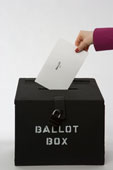
Green ballot issues had mixed success Tuesday night. Here is a quick look.
Here in Pennsylvania, 2.8 million, or 61 percent of the people voting, supported the referendum seeking permission to borrow $400 million to pay for upgrades and repairs to aging sewer and water infrastructure.
"The $400 million bond issue will allow the Pennsylvania Infrastructure Investment Authority, or PENNVEST, to award grants and loans for water treatment systems and pipelines. The money will be available for municipally owned drinking water and wastewater systems in every corner of the state, large or small, urban or rural," according to a release from the Pennsylvania Department of Environmental Protection.
The funding will be available to the 183 publicly owned water systems that are facing federal mandates to reduce nutrient pollution in the Susquehanna and Potomac river basins and in the Chesapeake Bay.
The Sustainable Infrastructure Task Force that Governor Rendell convened early this year released a report last week citing at least $36.5 billion in capital repairs and upgrade that are needed statewide over the next 20 years to maintain service. In addition, the task force estimates the commonwealth will need to spend another $77.1 billion for operation, maintenance and debt service. The report is available online at
this link; click on the “Clean Water referendum” link.
"This is part of a larger national problem," said Rendell. "Across the country, we're confronted with a staggering total of national infrastructure shortfall of $1.6 trillion," he said in the release.
According to the Department of State Web site, the meassure passed with 59.6 percent of the vote in Berks County; 61.3 percent in Chester County and 68.2 percent in Montgomery County.
Also in Pennsylvania, Adams County approved a $10,000,000 Bond for the preservation of farmland, open space, habitat, and watersheds. It passed by 75% approval. And in Upper Saucon Township, voters approved a $24,000,000, 0.25 percent earned income tax increase for open space and recreational lands. It passed by 50% approval.
In California, two green initiatives were rejected by voters. Nearly two-thirds rejected a measure that would have required the state's utilities to generate half their electricity from windmills, solar systems, geothermal reserves and other renewable sources by 20205.
A second proposition, which would have floated a $5 billion bond to give rebates to Calinfornians who buy alternative fuel vehicles, as well as set aside money for research, was also defeated.
Also in Califnornia, a $9.95 billion project to pay for a high-speed train, passed by five percentage points.
However, in Missouri, voters approved a similar but less ambitious measure to the California question which will require the "show Me" state to produce 15 percent of its electricity from clean energy in 20201.
And in Florida, voters approved a measure that will allow homeowners to install renewable energy devices on their property without changing its value for tax purposes.
In Colorado, a measure that would have ended tax credits for the oil and gas industries, adding $300 million a year to state coffers, was defeated when the industry spent $11 million in an advertising blitz to defeat it, The Denver Post reported.
The tax break is so effective that 81 percent of the companies for a tax refund in 2004. The new money would have been used to college scholarships for families who make less than $100,000 a year.
A $3.4 million ballot measure in Maine to pay for water projects passed by a slim margin.
The people have spoken.
Labels: ballot measures, California, Colorado, Maine, Missouri, Pennsylvania


 selecting candidates who have "pro-green" policies on Tuesday, voters across the country (including here in Pennsylvania) will also be able to vote on those green policies themselves.
selecting candidates who have "pro-green" policies on Tuesday, voters across the country (including here in Pennsylvania) will also be able to vote on those green policies themselves.